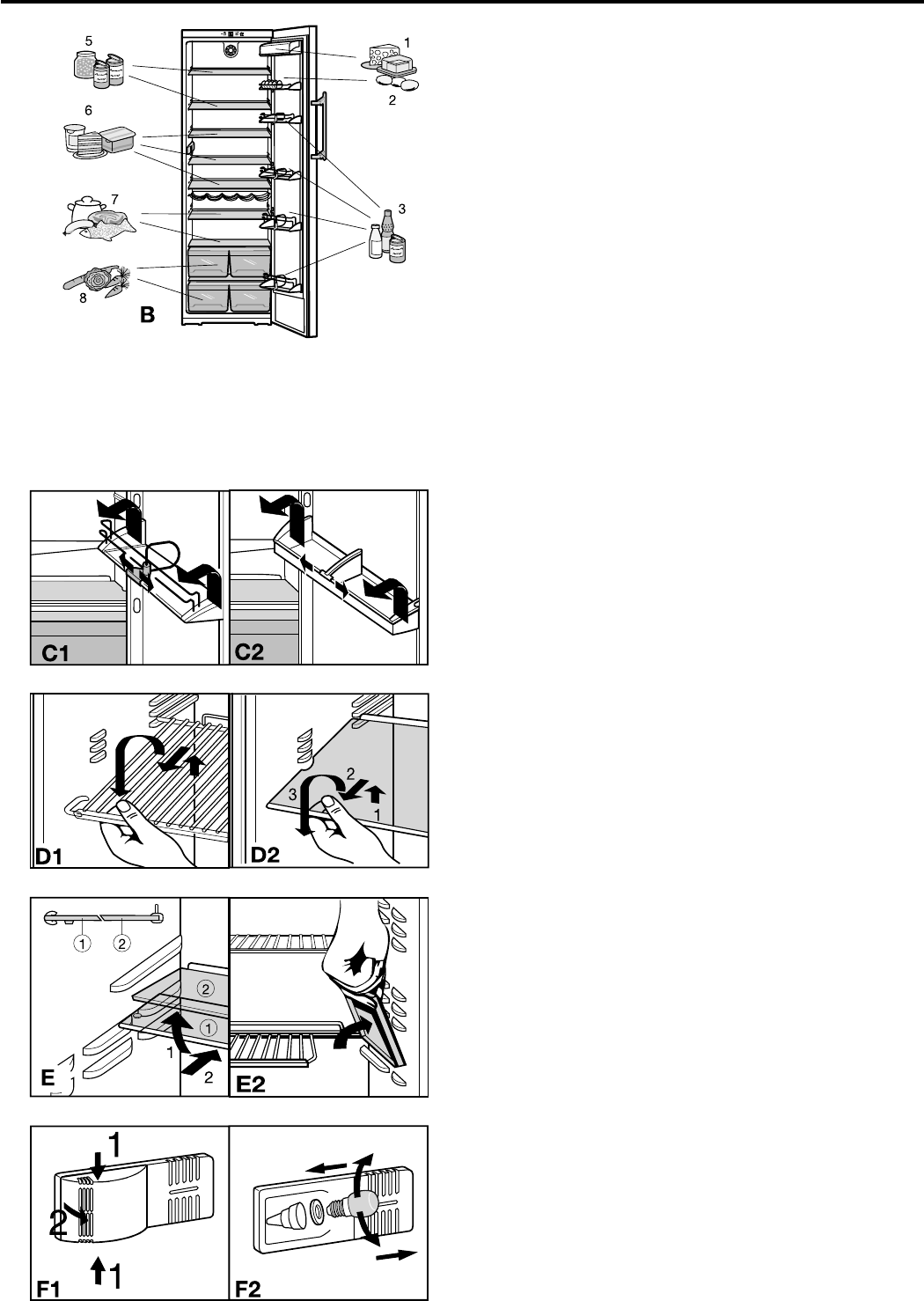
14
K/SK/es..0
Storage, shelf arrangement, interior light
Arranging food in the refrigerator
The natural circulation of the air inside the refrigerator
results in different parts of the refrigerator having different
temperatures. This can have its advantages for different
types of food. The refrigerator is coldest just above the veg-
etable bins and against the rear wall (suitable for sau-sage
and meat products etc.); it is warmest at the front at the top
and in the door (suitable for spreadable butter, cheese etc.).
See fig. B for food storage suggestions.
Notes on cooling
- Store food so that air can circulate properly around it.
Do not pack the refrigerator too full. Do not cover the fan
slits* at the back, otherwise the refrigerating capacity will
be impaired!
- Food which gives off or absorbs odours and flavours,
and liquids should always be stored covered or in closed
containers.
- Always store food which gives off or is sensitive to ethyl-
ene gases such as fruit, vegetables and salads separately
or wrapped in order not to affect their storage life; e.g. do
not store tomatoes together with kiwis or cabbage.
Changing shelf arrangement
You can re-arrange the height of the shelves and door racks
as required.
W Re-positioning the door racks, fig. C: Slide the door
rack up, pull out towards you and replace in reverse
order.
W By adjusting the bottle holder you can protect the
bottles from falling over when the door is opened and
closed. Always hold by the plastic handle.
W Re-positioning the shelves, fig. D:
- Lift the shelf, slide forwards and remove.
Always insert shelves with the guard bar at the back
pointing upwards, otherwise food may freeze onto the
rear wall.
- The glass shelves are fitted with stops to prevent them
being pulled out accidentally.
W If you require space for large bottles and containers,
- lift the front half of the split glass shelf* and carefully
slide it under the back half until the stops* click into the
recesses, fig. E1, or
- lift up the flap* in the grid shelf, fig. E2.
Interior light
This switches off automatically after the door has been
opened for approx. 15 minutes. If it does not switch on
when the door is opened briefly, but the temperature setting
display is working, the bulb may be defective.
Changing the bulb:
W Bulb data: max. 25 W, voltage and current should agree
with the details on the type plate. Only use bulbs of the
same size. Bulb fitting: E 14.
W Switch off the appliance.
Pull out the plug or switch off/unscrew the fuse.
W Fig. F1: Press the light cover together at the sides (1), lift
out and unclip (2).
W Fig. F2: Replace the bulb. To counteract the friction of
the lock washer, turn the bulb with slightly more pressure.
When inserting the new bulb, ensure that the lock washer
is properly in place in the lamp socket.
W Clip the back end of the cover in and clip the sides into
place.
* Depending on model and options
1 butter, cheese
2 eggs
3 cans, drinks, bottles
5 preserves, baked goods
6 dairy products
7 meat and sausage
products, fish, pre-cooked
meals
8 fruit, vegetables, salad


















